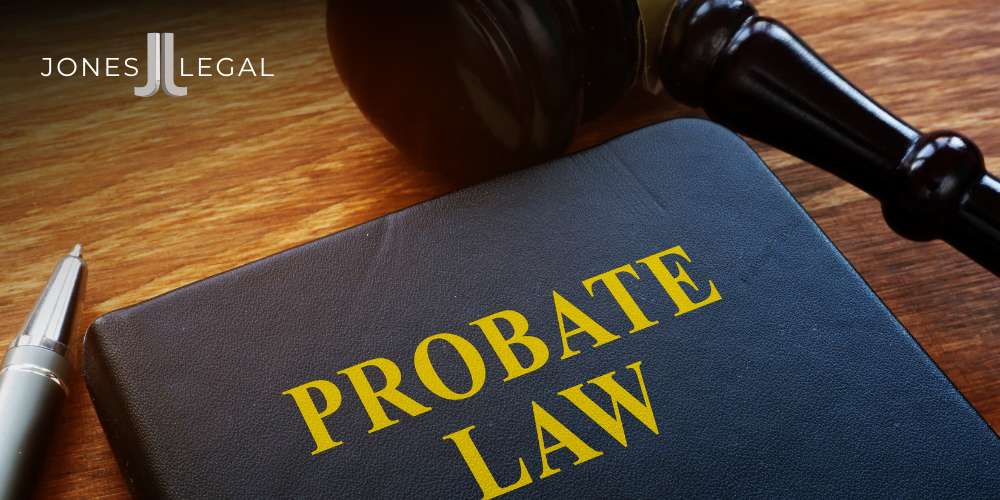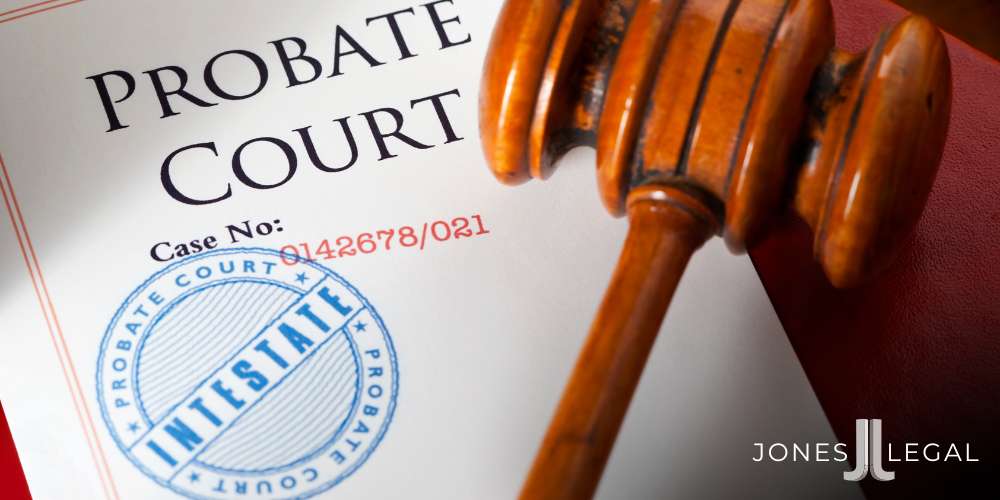Riverside Probate Attorney
You don’t have to navigate this grueling process alone. Our Southern California estate planning law firm is here to simplify the process, protect your interests, and ensure that your loved one’s estate is handled properly. Contact our law firm today by calling (951) 742-7213 or reach out online to schedule a free consultation.
Request a Free Consultation
Experienced Riverside, California Probate Lawyer
Losing a loved one is never easy, and dealing with the legal issues surrounding probate can make an already difficult time even more overwhelming. Families in Riverside County, San Bernardino County, and across the Inland Empire often find themselves navigating a maze of paperwork, court procedures, and legal requirements, unsure of how to proceed. Many feel burdened with the responsibility of managing their loved one’s estate while also coping with grief.
At Jones Legal, we understand these challenges and are here to provide the guidance and support you need. As an experienced Riverside probate attorney, Jennifer Jones has spent years assisting families across Southern California with probate cases, estate administration, and estate planning as a whole. Whether you are facing a complex probate dispute, need assistance with administering a trust, or are simply looking to ensure a smooth and worry-free process, she and her legal team are committed to helping you every step of the way.

What is Probate?
Most people are unfamiliar with the legal process that follows a loved one’s passing, which can make probate feel overwhelming and complicated. Probate is the formal legal procedure that an estate must go through after someone dies to ensure that their assets are properly distributed and their financial obligations are settled. This process is designed to verify the validity of a will (if one exists), oversee the handling of the deceased person’s property, and ensure all debts and taxes are paid before the estate is distributed to heirs or beneficiaries.
Probate and estate administration typically include:
- Proving the validity of a deceased person’s will in court
- Locating and taking inventory of all personal and financial assets of the deceased
- Appraising the value of the deceased person’s property for tax and distribution purposes
- Paying outstanding debts, final expenses, and estate taxes
- Overseeing the proper distribution of assets according to the will or state laws
Since probate law can be complex and time-consuming, many families hire a lawyer to ensure the process is handled efficiently and correctly. An experienced Riverside probate attorney can reduce the stress that often accompanies these legal matters, helping families navigate probate with greater confidence and peace of mind.
California Probate Laws
California’s probate laws govern the process of distributing a deceased person’s estate, ensuring that assets are transferred according to a valid will or state intestacy laws if no will exists. Here are some of the key takeaways from these laws:
- Probate is typically required for all estates exceeding a certain value, while smaller estates may qualify for simplified procedures (more on this below).
- The process begins when an executor or administrator is appointed by the probate court to manage and distribute assets, pay debts, and handle any legal claims.
- California follows a tiered system of inheritance for intestate estates, prioritizing spouses, children, and other close relatives.
- The state allows certain assets, such as joint tenancy property, payable-on-death accounts, and living trusts, to bypass probate.
- The probate process can take several months to years, depending on the estate’s complexity.
- California law imposes statutory fees on attorneys and executors based on the estate’s value.
Qualifications for a Small Estate
Every state has different qualifications for small estates. According to California courts, a small estate is considered one that’s worth less than $184,500 if the person died after April of 2022 or less than $166,250 if they passed before April of 2022. This is true as of January of 2025, though the values are subject to change again in April of this year.

What is Summary Probate?
A summary probate proceeding is basically a simpler probate process that is reserved for small estates. This simplified probate proceeding can save everyone money, time, effort, and grief.
Summary probate applies to lower-valued estates ($184,500 or less as of January 2025, though subject to change later this year), excluding assets that bypass probate, such as joint tenancy property, payable-on-death accounts, and assets held in a living trust. The process varies based on the estate’s circumstances:
- Affidavit for Small Estates – If the total value of the probate estate is lower than what the state provides for, heirs can use an Affidavit for Collection of Personal Property to claim assets without court involvement.
- Spousal Property Petition – A surviving spouse or registered domestic partner can use a spousal property petition (Form DE-221) to transfer property without going through full probate, regardless of the estate’s total value.
- Summary Probate for Real Property – If the estate includes real estate valued at $61,500 or less, heirs can use a simplified petition process using Form DE-305.
Summary probate can significantly reduce the time and cost associated with estate administration, making it a practical option for many smaller estates in California.
California Intestacy Laws
Intestate succession laws apply if a person dies without a will or trust in place. In California, if a person dies with:
- Children but no husband or wife, then the children inherit the estate.
- A spouse but no parents, siblings, or children, then the spouse will inherit the estate.
- Parents but no siblings, spouse, or children, then the parents will inherit the estate.
- Siblings but no parents, spouse, or children, then the siblings will inherit the estate.
- A spouse and one grandchild or child, then the spouse will inherit all of the community property but only half of the separate property.
- Multiple children and a spouse, then the spouse will inherit all community property and a third of the separate property. Meanwhile, the children will inherit two-thirds of the separate property.
- Multiple grandchildren from a deceased child and a spouse, then the spouse will inherit a third of the community property and the grandchildren will inherit two-thirds of the separate property.
- Parents and a spouse, then the spouse will inherit all community property and half of the separate property.
- Siblings and a spouse, then the spouse will inherit all community property and half of the separate property. Meanwhile, the siblings will inherit the other half of the separate property.

What Assets Go Through Probate in California?
In California, certain assets must go through probate if they are solely owned by the deceased, do not have a designated beneficiary or a method of automatic transfer, and do not meet the requirements for small or “summary” probate proceedings. Below is a list of assets that typically require probate:
- Solely Owned Assets (No Co-Owner or Beneficiary)
- Real estate solely in the deceased’s name (house, land, commercial property)
- Bank accounts without a payable-on-death (POD) or transfer-on-death (TOD) designation
- Investment accounts without a named beneficiary
- Personal Property Exceeding Probate Threshold
- Jewelry, artwork, vehicles, and collectibles
- Furniture, electronics, and other valuables
- Cash or safety deposit box contents owned solely by the deceased
- Business Interests
- Sole proprietorship assets
- Ownership shares in a corporation, LLC, or partnership that do not have a buy-sell agreement or succession plan
- Life Insurance Policies and Retirement Accounts Without Beneficiaries
- Life insurance payout, 401(k), IRA, or pension plans without a designated beneficiary
- Real Estate and Other Assets Held as “Tenants in Common”
- If the deceased co-owned property as tenants in common, their share must go through probate (unlike joint tenancy with right of survivorship, which avoids probate).
- Unpaid Wages or Other Income Due to the Deceased
- Final paychecks, commissions, or owed compensation
- Assets Without a Trust
- Any assets not placed in a revocable living trust
If there are assets that require probate court proceedings, the executor specified in the will is responsible for starting and concluding the probate litigation. The probate court will appoint an executor if there is no will or if the will does not specify one. In either case, the executor can hire a probate lawyer to represent them in court. They may also use the estate’s money to pay the probate lawyer fee.

What Assets Do Not Go Through Probate in California?
There are, however, many assets left behind by a deceased person that may not need to go through probate courts. If the person who died was married, had joint ownership over many assets, or already did some probate administration, probate may be unnecessary.
Listed below are specific assets that do not need to undergo probate:
- 401ks, IRAs, or any other retirement accounts that name beneficiaries
- Life insurance money, but not if the estate is listed as the beneficiary
- Specific property that’s included in a living trust
- Money that’s included in a payable-on-death (POD) bank account
- Savings bonds that are included on the POD form
- Stocks, bonds, ETFs, and other securities that are listed on a transfer-on-death form
- Jointly-owned savings bonds
- Real estate property that has a TOD deed
- Distributions from pension plans
- Property that’s jointly held with right of survivorship
- Property that’s owned by tenants by the entirety with a spouse
- Boats or cars that are listed on the TOD form
- Cars that are passed down to family in accordance with state law
- Various household assets that are passed down to family in accordance with state law
How To Start Probate in California
The process begins by filing a Petition for Probate with the Riverside County Superior Court (or the probate court in the county where the deceased lived). This petition requests the court to appoint an executor (if there is a will) or an administrator (if there is no will) to manage the estate. After filing, the court schedules a hearing, and notices must be sent to heirs and beneficiaries. Once approved, the executor or administrator takes inventory of assets, pays debts and taxes, and distributes the property according to the will or California’s intestacy laws.
If you are a family member responsible for handling the estate, consulting an experienced attorney can help simplify the process. A Riverside probate attorney like Jennifer Jones at Jones Legal can guide you through each step to ensure compliance with California law and help you avoid any unnecessary delays and mistakes.
If you need assistance with the probate process in Southern California, schedule a free consultation with an experienced attorney on our team to discuss your case today.

Do I Need a Probate Attorney in California?
If you are grieving the loss of a loved one, having to deal with probate matters can make this difficult time even more challenging. While probate is not always required, working with an attorney can help ensure the process runs smoothly and in compliance with California law when it is. With their vast knowledge of estate and trust administration and California’s probate court procedures, a Riverside probate attorney like those at Jones Legal can make the process more manageable.
What Do Probate Lawyers Do?
Probate lawyers play a crucial role in managing the legal process of distributing a deceased person’s estate. They work in the best interest of their clients, ensuring that assets are properly handled and that beneficiaries receive what they are entitled to. Whether it’s guiding families through probate administration, protecting wealth for the future, or resolving disputes, probate lawyers provide essential legal support.
When conflicts arise, such as contested wills or disputes over estate distribution, an attorney can assist with mediation to reach a fair resolution. If mediation is unsuccessful, they can also represent clients in probate litigation, advocating for them in court while protecting their rights and future.
Have more California probate FAQs? Reach out to Jones Legal today!

How to Avoid Probate in California
You may be able to help your heirs avoid the probate process altogether by implementing effective estate planning strategies that ensure your inheritance passes smoothly and efficiently. One of the most reliable ways to protect your assets is by placing them in a trust, allowing you to designate beneficiaries who will receive them directly upon your passing. Additionally, listing specific financial accounts on a payable-on-death form ensures that funds transfer to your chosen recipients without probate delays.
Another way to bypass probate is through joint tenancy ownership, where property automatically transfers to the surviving owner. In any case, consulting with an experienced Riverside, CA estate planning attorney at our firm can help you determine the best approach to protect your assets and streamline their distribution for your loved ones.
Why Choose Jones Legal for Your Inland Empire Probate Needs?
At Jones Legal, Jennifer Jones provides exceptional legal services to clients facing the challenging probate process in Riverside and the surrounding Inland Empire. As a dedicated Riverside probate attorney, she combines sensitivity coupled with an aggressive approach to ensure estates are administered efficiently and fairly.
In all probate matters, from estate administration to probate litigation, our law firm is committed to protecting your best interests through and through.

Contact an Experienced Riverside Probate Lawyer at Jones Legal Today!
Needless to say, the probate process in California can be a daunting undertaking, but you don’t have to face it alone. For clients in the Inland Empire area, Jones Legal is here to provide assistance with all legal matters related to probate, estate administration, and trusts. Whether you need guidance on probate filings, asset distribution, or contested estates, an experienced Riverside estate planning attorney on our team is here to help.
Take the first step toward protecting your loved one’s legacy by contacting our law offices today at (951) 742-7213 to schedule a free consultation.

